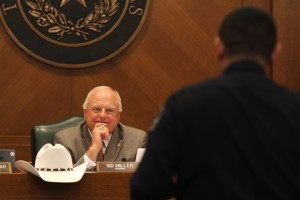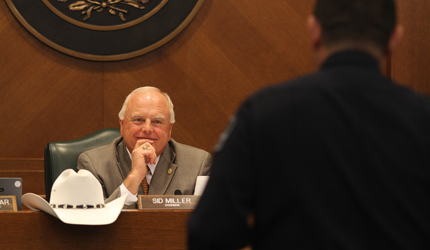
Rep. Sid Miller of the Homeland Security and Public Safety Committee listens to Austin Police Chief Art Acevedo on Wednesday at the Texas Capitol as he argues against the passing of the four house bills that would allow concealed handgun license holders to carry their firearms on public university campuses.
By Daniel C. Houston
Reporter
AUSTIN — A bill that would require public universities to allow concealed-carry license holders to bring handguns onto public university campuses is now one step away from consideration on the floor of the Texas House of Representatives.
The bill, H.B. 750, passed 5-3 Wednesday in the Homeland Security and Public Safety Committee after more than five hours of public testimony. The bill was then referred to the House Calendars Committee, which will determine if and when it will arrive on the House floor for consideration.
Of the Calendar Committee’s 15 members, 11 are listed as coauthors for H.B. 750, all but assuring it will reach the floor of the House. A majority of all House representatives also signed on in support of the bill, making it highly likely the House will pass the legislation and place its fate in the hands of the Texas Senate.
Republican Rep. Sid Miller, chair of the committee and joint author of H.B. 750, said more than 800 individuals stood before the committee to testify for or against the bill and three similar ones.
“They shared their concerns. I think most of those concerns were addressed in the bill as far as [carrying firearms] in the dormitory and in the bars, and that’s not going to happen. I think we’ve got a good bill. Obviously a lot of my colleagues do, too.”
Many of the testimonies on both sides of the issue were emotionally charged, as in the case of John Woods, whose girlfriend was killed in the 2007 shootings on the campus of Virginia Tech University.
“You’re trying to address the rare day when a campus shooting occurs,” Woods said in his testimony, “but what about all the days when campus shootings aren’t occurring? What will you do when someone gets mugged on campus, pulls out a gun but isn’t fully prepared to use it, and that firearm gets used against that person for something much worse? Will you call her parents?”
Woods went on to say none of the survivors of the Virginia Tech shootings of which he is aware, nor the families of the victims, support allowing concealed firearms on college campuses.
“These bills are about an ideological agenda, not about campus safety,” Woods said, “and I urge you to vote ‘no’ on all four.”
Scott Lewis, the Texas legislative director for Students for Concealed Carry on Campus, said when concealed-carry legislation first allowed handguns to be taken onto public premises about 15 years ago, Texas legislators were concerned about its experimental nature and banned them in sensitive areas like churches and college campuses. Now, Lewis believes the evidence shows those concerns were unfounded.
“I think it’s important to keep in mind that this is about personal security, not campus security,” Lewis said. “We’re not suggesting that concealed handgun license-holders be tasked with protecting campus; we’re not trying to create some sort of amateur security force. We are suggesting that individuals be allowed the means to protect themselves.”
Of the individuals who testified against the legislation, many recognized the likelihood that H.B. 750 would pass and proposed amendments that would mitigate what are, in their opinions, the negative effects of the bill. The most common amendment requested was that individual public universities and colleges be allowed to determine the weapons policy on their respective campuses, as private institutions like Baylor are allowed under the bill, rather than having to comply with a statewide policy. The committee did not make any such amendments to the bill before voting to pass it.
Dr. William Holda, president of Kilgore College and chair-elect of the Texas Association of Community Colleges, questioned the rationality behind allowing private institutions to opt out of the policy while not allowing public institutions to set their own policy.
“The state gives $300 million a year in tuition equalization grants to private colleges, so that technical argument that they receive no state funds is really not true,” Holda said. “I’m not saying, ‘Don’t let them opt out.’ I really am not. I think our association would like our local boards to have that option also.”
The state’s numbers reflect private institutions received closer to $212 million in tuition equalization grants during the 2010-2011 fiscal biennium and stand to lose up to $87.4 million over the next two years, according to the Texas Legislative Budget Board’s original budget proposal this session.






